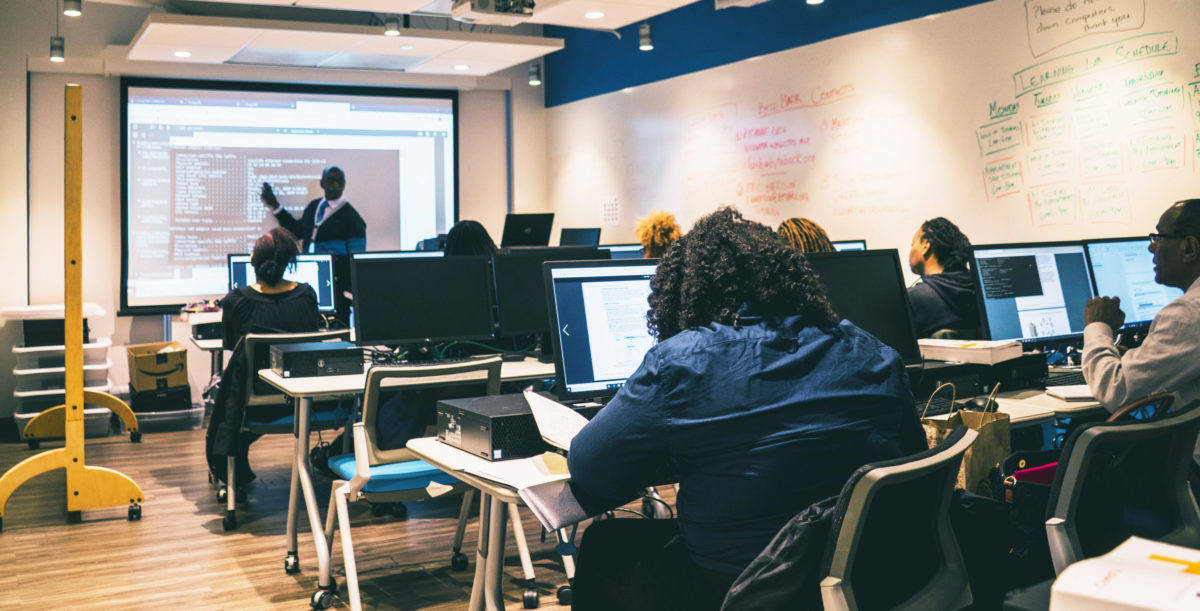Author’s Note: It’s been the greatest pleasure of my career so far serving as the communications director of Byte Back and being part of the DC tech community. Over the past couple years, I’ve also been thrilled to advocate for digital equity in DC. In July, I’ll be starting as communications director of the National Digital Inclusion Alliance and look forward to staying connected to this ever-important movement. I encourage everyone across D.C. tech to support inclusive tech causes like Byte Back right here in your community.
The bright spot of the COVID-19 pandemic, if there is one, is that inequities were brought to light.
To be sure, this resulted from struggles. We’ve heard stories of children who didn’t have devices at home for schooling, of people using parking lot Wi-Fi and of adults struggling to find new employment because of a lack of digital skills. But it was coupled with rising awareness. People saw that digital divides are real.
D.C. is no exception. The digital divide here is real. And, because of a lack of funding in D.C. government over the past couple years, we’ve made limited progress toward closing the gap.

Yvette Scorse.
We’ve also seen how the digital divide has a disproportionate impact on residents with lower incomes, on Black and Latinx residents, on older residents and other vulnerable populations. In D.C., 12% of Black households do not have high-speed internet, while only 1.6% of white households don’t have access. And more than 50% of households in Wards 7 and 8 don’t have broadband.
In Washington, D.C., as in other urban environments, the incongruities in broadband use are mainly due to lack of adoption. In addition to affordability, most Americans who aren’t connected don’t have the skills to use technology or it’s too difficult or frustrating. D.C. must invest in demystifying technology through education on how to use the internet for living, learning, health and work.
Thanks to a combination of awareness, advocacy, and federal dollars, this year is looking different. The DC Office of the Chief Technology Officer is set to allocate $25.9 million from the American Rescue Plan Act for digital inclusion. This is $25.9 million more than has been allocated in the past couple years. It can make a real difference, but only with a holistic approach and clear outcomes.
Digital inclusion involves three elements: (1) high-speed internet connection, (2) a device, and (3) skills training to demystify technology and use it to its fullest. While Byte Back’s niche is in skills training, the organization has been fighting for all three aspects because we cannot have digital equity if one is missing.
The D.C. government also needs clear leadership in terms of digital inclusion. The District’s systems, residents, and institutions need to be involved – from the public schools, to the DC Public Library, the Department of Employment Services, and even the DC Housing Authority. This seems to be one of the intentions of the Internet Equity Amendment Act of 2021. Introduced by Councilmember Charles Allen, it seeks to connect all residents to the internet and create a digital equity division in D.C.
Digital equity doesn’t require a one-time fix...It’s a complicated problem, and building a division for long-term solutions is ideal.
Digital equity doesn’t require a one-time fix. It requires more than a schools-based approach. It requires more than a tablet. It’s a complicated problem, and building a division for long-term solutions is ideal.
Over the past year, without government-funded digital inclusion projects and in the middle of a pandemic that sunk us deeper into a digital divide, our community has suffered. Now is the time to make digital equity a priority in our recovery. Residents of every ward deserve to safely support their families, engage with their communities, secure living-wage careers, and have equal access in today’s digital society and economy.
Creating a digital equity division would ensure that digital equity isn’t a one-time project, but part of a long-term strategy as technology continuously evolves and digital needs change. Additionally, the bill rightly considers standards of speed and affordability and stipulates evaluations of the District’s current state of connectivity.
Both OCTO’s budget and the new legislation need to consider that D.C. has fallen behind in implementing solutions for a couple years. We need to catch up. We need all three elements of digital inclusion. We need better data to understand the problem, and we need a comprehensive plan. We need outreach funds to reach residents who are living in a low-tech or no-tech world. We need solutions that distribute resources equitably.
If you agree, please join Byte Back and the Coalition on Nonprofit Housing and Economic Development (CNHED) and sign the petition here. Your signature and support can make a difference in lasting solutions and digital equity.
Before you go...
Please consider supporting Technical.ly to keep our independent journalism strong. Unlike most business-focused media outlets, we don’t have a paywall. Instead, we count on your personal and organizational support.
Join our growing Slack community
Join 5,000 tech professionals and entrepreneurs in our community Slack today!

The person charged in the UnitedHealthcare CEO shooting had a ton of tech connections

The looming TikTok ban doesn’t strike financial fear into the hearts of creators — it’s community they’re worried about

Where are the country’s most vibrant tech and startup communities?


